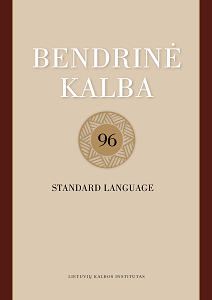Ideologizacijos raiska pokario Lietuvių kalbotyroje
Expression of Ideologization in Post-War Lithuanian Linguistics
Author(s): Danguole MikulėnienėSubject(s): Language studies, Lexis, Historical Linguistics, Sociolinguistics, Baltic Languages, Pre-WW I & WW I (1900 -1919), WW II and following years (1940 - 1949)
Published by: Lietuvių Kalbos Institutas
Keywords: Lithuanian linguistics; lexicography; dialectology; language history; ideologization; simplification;
Summary/Abstract: This article aims to analyse the methods of ideologization applied in Lithuanian linguistic academic literature during the post-World War II period. Based on a series of publications by the prominent academic linguists Juozas Balčikonis, Jonas Kruopas and Kazys Ulvydas, the study investigates the shaping of Lithuanian linguistics in the 1950s with a view of identifying the diversity of forms of ideologization reflected in the nature and structure of post-war linguistic activities. The aim of this article is to analyse, with referring to primary sources (articles written during the early post-war period by linguists Juozas Balčikonis, Jonas Kruopas and Kazys Ulvydas), a selection of linguistic publications in order to develop an algorithm for conducting more in-depth studies of the soviet-period linguistic activities. The tasks of the study were to (1) analyse the methods of ideologization and their expression in Lithuanian linguistic academic literature based on the publications on the time; (2) identify the ways in which the content of Lithuanian linguistics was being shaped during the post-war period; (3) summarise the results of the study. The analysis conducted shows that the publications of the early post-war period are all characterised by a near-identical macrostructure. Ideologically mandatory linguistic cliches were used either throughout the entire text or just in the foreword and conclusion of the article. In the first case, the entire academic content was ideologized, while in the second example, publications - although ideologically “framed” - could still retain their academic value. The analysis shows that early post-war ideologization displayed certain characteristic elements used in linguistic publications: methodological provisions expressed through the aim of the article and the tasks set; the “correct” choice of object, material and method of research; the academic apparatus, i.e. referencing the literature listed and quoted; the structure of the article - the cliches in beginning and the ending; the correlation between the academic content and the ideology of the time. Post-war linguistic articles display frequent simplification of ideologized content which is often expressed through ellipsis or distortion of linguistic content. The most recognisable form of simplification is related to various Marxist-Leninist dogmas adapted to linguistic content. The unique style of the author is often steamrolled through the use of specific (and simplified) figures of speech as a means of expressing academic thought. This is why, when assessing the linguistic work conducted by prominent Lithuanian academics in the 1950s, it is helpful not to discard the authentic cliches appearing in their works and biographies.
Journal: Bendrinė kalba (iki 2014 metų – Kalbos kultūra)
- Issue Year: 2023
- Issue No: 96
- Page Range: 39-53
- Page Count: 15
- Language: Lithuanian

